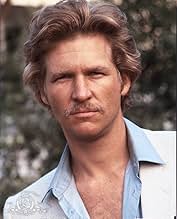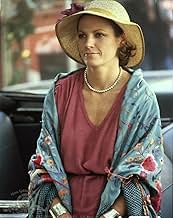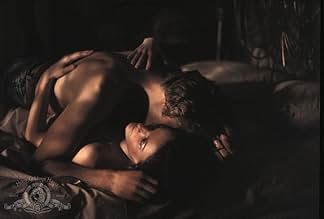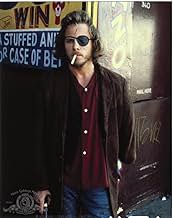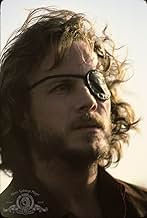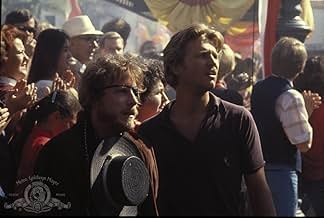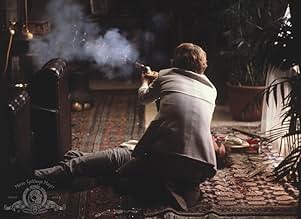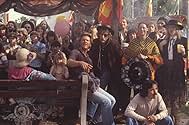IMDb RATING
6.8/10
8.3K
YOUR RATING
Richard spots a man dumping a body, and decides to expose the man he thinks is the culprit with his friend Alex Cutter.Richard spots a man dumping a body, and decides to expose the man he thinks is the culprit with his friend Alex Cutter.Richard spots a man dumping a body, and decides to expose the man he thinks is the culprit with his friend Alex Cutter.
- Director
- Writers
- Stars
- Awards
- 2 wins & 2 nominations total
Francis X. McCarthy
- Toyota Man
- (as Frank McCarthy)
- Director
- Writers
- All cast & crew
- Production, box office & more at IMDbPro
Featured reviews
Cutter's Way cannot be overpraised. This movie is a masterpiece of the first order. Ivan Passer, a compatriot of Milos Forman, came to the USA as an experienced Czech movie director. Not unlike Alfred Hitchcock or some German directors 30 years before him, he seems to have made a thorough analysis of the American social conditions and general manners. He then transformed his findings into movies. Two of them I know deal with New York. They are appropriately gritty. The setting of Cutter's way is a Californian beach community for the rich and beautiful and the movie is appropriately glossy. The whole story takes place in those paradisiac locales. They are presented like an enchanted kingdom, a country of its own.
Under the glossy surface, there is a darker side to the place. There is prostitution, drug abuse and murder. Cutter, living on the fringes of the enchanted kingdom, sees that more clearly than everyone else. He has his own code of chivalry by which he wants to live. He develops conspirational theories and strains to convert them into hard facts. The world around him, populated by indifferent, amoral rich and beautiful people, does not understand him, does not even want to listen, laughs at him. So Cutter mounts a white stallion and rides a charge.
Repeatedly the film slips into surrealistic situations, in which the impression made on the viewers is more relevant than the storyline. This technique was well known in the forties (e.g. in film noir), present day audience are less used to it. In the earlier days of film making, surrealism was created on a soundstage, and the change between reality and "dream" became immediately clear. Passer uses real locations for situations removed from reality a daring experiment that rewards the viewers with hauntingly beautiful pictures but might also confuse many. The director took this risk and we are rewarded with a magnificent picture about a distinguished slice of America. I predict: Cutters way will one day become an honored classic.
Under the glossy surface, there is a darker side to the place. There is prostitution, drug abuse and murder. Cutter, living on the fringes of the enchanted kingdom, sees that more clearly than everyone else. He has his own code of chivalry by which he wants to live. He develops conspirational theories and strains to convert them into hard facts. The world around him, populated by indifferent, amoral rich and beautiful people, does not understand him, does not even want to listen, laughs at him. So Cutter mounts a white stallion and rides a charge.
Repeatedly the film slips into surrealistic situations, in which the impression made on the viewers is more relevant than the storyline. This technique was well known in the forties (e.g. in film noir), present day audience are less used to it. In the earlier days of film making, surrealism was created on a soundstage, and the change between reality and "dream" became immediately clear. Passer uses real locations for situations removed from reality a daring experiment that rewards the viewers with hauntingly beautiful pictures but might also confuse many. The director took this risk and we are rewarded with a magnificent picture about a distinguished slice of America. I predict: Cutters way will one day become an honored classic.
The title "Cutter's Way" is a reference to the main character, Alexander Cutter, perhaps cinema's all-time best antihero. John Heard plays the difficult role of an angry Vietnam veteran who returned from what he now regards as a meaningless war minus an arm, an eye, and a leg. He hates the fat cats-feeling that they conned him and others into patriotically serving while they stayed home, and he resents his best friend Richard Bone (Jeff Bridges) who avoided the war and continues to avoid any involvement or commitment. Commitment is Alexander Cutter's one remaining virtue, when he sets his sights on taking down an arrogant oil tycoon who has gotten away with murdering a 17 year old cheerleader, he stubbornly refuses to give up this mission and insists on doing it his way.
Heard should have gotten the Best Actor Oscar in 1981 (it went to Henry Fonda for "On Golden Pond") but "Cutter's Way" was not popular with critics and viewers so Heard was not even nominated. It is an amazing performance as Heard must win audience sympathy for a character who is not only unpleasant, but terribly abusive to everyone- especially his wife and his only two remaining friends. But he earns our admiration with his final act as a knight (on a white horse) who gallops into danger to avenge his wife's murder.
With this Cutter is finally revealed as a romantic who is willing to back up his angry words and seemingly empty threats. His anger is over more than his wasted wartime sacrifice. He feels frustration and confusion because while he has remained the same, the world has changed around him in ways antithetical to his beliefs (can you identify with that?). He recognizes that he has become irrelevant to this world but is not going out until he has made a last stand. His commitment ultimately gets Bone to take his first moral stand and finish what his friend started, doing it "Cutter's Way".
Like "Fat City" (another of Jeff Bridges' early films) "Cutter's Way" is more appreciated now than at the time of its release. In part this is because both of these films have held up very well, if anything their political messages are even more relevant today. Thematically "Cutter's Way" is a political film-both anti-war and anti-power; very much in the tradition of "Chinatown" and the world of Raymond Chandler adaptations.
This film is essentially a character study with an expressionistic ending. Most action/adventure fans will find it way too slow and cerebral for their tastes. The acting and the themes are its strength, the contrived story is a non-fatal flaw. The multi-dimensionality of Cutter, Bone, and Cutter's wife Mo (an extraordinary performance by Lisa Eichhorn) are carefully crafted and revealed by director Ivan Passer. Cutter's other remaining friend George (Arthur Rosenberg) is equally well crafted but more secondary to the story.
A fifth character (the dead cheerleader's older sister played by Ann Dusenberry) appears to be a victim of the post-production process as she simply disappears without explanation about 20 minutes before the film's end. Normally the absence of a supporting character would go unnoticed but Dusenberry had done such a nice job developing this character (maximizing what little she was given to work with) that the absence is glaring. Contemporary audiences will see a lot of Dominique Swain in Dusenberry. They not only look enough alike to be sisters but they have the same confident flare to their acting style. Passer had to work hard to keep Dusenberry reined in but succeeded in getting a nice restrained performance from her, her high intensity peeks through just enough to convey that there is more to her character than meets the eye.
Then again, what do I know? I'm only a child.
Heard should have gotten the Best Actor Oscar in 1981 (it went to Henry Fonda for "On Golden Pond") but "Cutter's Way" was not popular with critics and viewers so Heard was not even nominated. It is an amazing performance as Heard must win audience sympathy for a character who is not only unpleasant, but terribly abusive to everyone- especially his wife and his only two remaining friends. But he earns our admiration with his final act as a knight (on a white horse) who gallops into danger to avenge his wife's murder.
With this Cutter is finally revealed as a romantic who is willing to back up his angry words and seemingly empty threats. His anger is over more than his wasted wartime sacrifice. He feels frustration and confusion because while he has remained the same, the world has changed around him in ways antithetical to his beliefs (can you identify with that?). He recognizes that he has become irrelevant to this world but is not going out until he has made a last stand. His commitment ultimately gets Bone to take his first moral stand and finish what his friend started, doing it "Cutter's Way".
Like "Fat City" (another of Jeff Bridges' early films) "Cutter's Way" is more appreciated now than at the time of its release. In part this is because both of these films have held up very well, if anything their political messages are even more relevant today. Thematically "Cutter's Way" is a political film-both anti-war and anti-power; very much in the tradition of "Chinatown" and the world of Raymond Chandler adaptations.
This film is essentially a character study with an expressionistic ending. Most action/adventure fans will find it way too slow and cerebral for their tastes. The acting and the themes are its strength, the contrived story is a non-fatal flaw. The multi-dimensionality of Cutter, Bone, and Cutter's wife Mo (an extraordinary performance by Lisa Eichhorn) are carefully crafted and revealed by director Ivan Passer. Cutter's other remaining friend George (Arthur Rosenberg) is equally well crafted but more secondary to the story.
A fifth character (the dead cheerleader's older sister played by Ann Dusenberry) appears to be a victim of the post-production process as she simply disappears without explanation about 20 minutes before the film's end. Normally the absence of a supporting character would go unnoticed but Dusenberry had done such a nice job developing this character (maximizing what little she was given to work with) that the absence is glaring. Contemporary audiences will see a lot of Dominique Swain in Dusenberry. They not only look enough alike to be sisters but they have the same confident flare to their acting style. Passer had to work hard to keep Dusenberry reined in but succeeded in getting a nice restrained performance from her, her high intensity peeks through just enough to convey that there is more to her character than meets the eye.
Then again, what do I know? I'm only a child.
Alex Cutter (John Heard) is a drunken disabled war veteran. His wife Mo (Lisa Eichorn) is also a drunken mess. Their best friend Richard Bone (Jeff Bridges) is a witness to a murder, and he thinks that the killer is this powerful oil tycoon JJ Cord (Stephen Elliott). Cutter refuses to let it go, and together with the victim's sister Valerie Duran (Ann Dusenberry) harasses Bone to get JJ.
The main drawback is that their plan was never going to work. If they really thought about it, they would see it as a fool's errand. The plan actually insulates JJ from any testimony from Bone. The plan actually helps JJ.
However we know Cutter is a drunk bastard. So I'm willing to believe that he would come up with a poorly constructed plan. It's the acting that is so superior in this. John Heard really goes all out, and Jeff Bridges' calmness makes them the perfect duo. I just love how crazy John Heard gets. He really shines.
The main drawback is that their plan was never going to work. If they really thought about it, they would see it as a fool's errand. The plan actually insulates JJ from any testimony from Bone. The plan actually helps JJ.
However we know Cutter is a drunk bastard. So I'm willing to believe that he would come up with a poorly constructed plan. It's the acting that is so superior in this. John Heard really goes all out, and Jeff Bridges' calmness makes them the perfect duo. I just love how crazy John Heard gets. He really shines.
I stumbled upon this movie at the Nickelodeon on Cape Cod the year of its release...at a time when VCR's and DVD's weren't a part of our culture...when you had to travel to obscure and far-out theaters to see obscure and far-out films during the fading window of opportunity offered as its limited run at the movie house. What a gem. I was instantly riveted by the story and the classic performances that brought it to life. The pathetic human condition personified in Cutter, Bone, and Mo is so exquisitely rendered as to be tragic...only salvaged by the clear-eyed wit and insight of John Heard's Cutter and the tempered and logical cynicism and indifference offered up by Bone(Jeff Bridges)as the balance that only these begrudging friends could provide each other. Lisa Eichorn's character(Mo) exhibits equal measures of the qualities both her male couterparts have and her subtle performance points up the conflict she feels in simultaneously rejecting and craving their opposing energies. The scene where she chews them both out for their selfish and naive plot and their spirited responses seems to spill from their beings as genuine emotion...not written dialogue...and it still sends chills through me...very powerful...and the scene where she is made painfully aware of Bone's incurable drive to bed women as she falls prey to his momentary sympathies ..when coupled with her husband's(Cutter) inability to give a soft refuge to her is so tragically realistic...tears flow. Everyone's shortcoming's cross-up everyone else's and as the surrealistic climax develops its symbolism and power are Shakespearian. This movie works as a crime thriller, a portrait of the underbelly of American culture most evidenced in its loss of confidence and embrace of cynicism that came to the surface post-Vietnam...but most successfully as a great character-driven love story and tragedy.
John Heard has got back from the war (it's not clearly said, but it's obvious it's Vietnam) with a patch on his eye and minus a leg and a hand. He's p-i-s-s-e-d off on the whole world, drinks a lot, and so does his wife. Jeff Bridges is a friend of both of them. He is a witness to a murder right in the beginning of the movie (so pay attention). John, with the deceased girl's sister thinks he knows how to nail who he thinks did it. Jeff doesn't really want to take part in it, you really don't want to see this movie. NOTHING happens. And they try to add a complication near the end, involving a history of a guy we hardly know... I'm sure it's a bad adaptation from the book, I hope so.
Did you know
- TriviaBefore production started on this film, Ivan Passer and producer Paul R. Gurian went to Jeff Bridges' house to ask him if he would agree to play Bone. After both entered Bridges' property, the actor's dog, a big German shepherd, attacked Gurian, biting him on the jaw. Gurian nearly died. Bridges later confessed that, after this incident, he had no choice but to accept the role in order to avoid being sued for several million dollars.
- GoofsValerie's disappearance is neither explained nor noted by the main characters.
- Quotes
Alex Cutter: I don't drink. You know, the routine grind drives me to drink. Tragedy, I take straight.
- How long is Cutter's Way?Powered by Alexa
Details
- Release date
- Country of origin
- Languages
- Also known as
- Cutter's Way
- Filming locations
- 800 Alvarado Place, Santa Barbara, California, USA(El Encanto Hotel scenes.)
- Production company
- See more company credits at IMDbPro
Box office
- Budget
- $3,000,000 (estimated)
- Gross US & Canada
- $1,729,274
- Gross worldwide
- $1,752,634
Contribute to this page
Suggest an edit or add missing content


